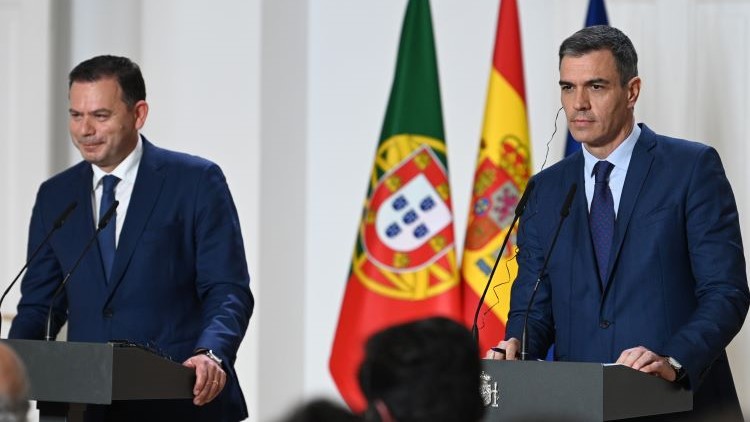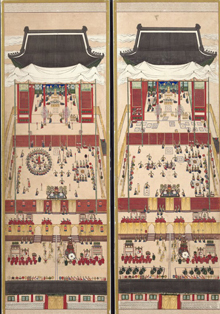Eduardo González
The President of the Government, Pedro Sánchez, and the newly appointed Prime Minister of Portugal, Luis Montenegro, expressed yesterday in Madrid their support for the recognition of the State of Palestine as part of the two-state solution, but they disagreed on the form, since, While the Spanish leader insisted on the bilateral route, the Portuguese showed his preference for “international consensus” within the EU and the UN.
In the joint press conference held at the Moncloa Complex, Sánchez assured that, after the bombing carried out by Iran against Israel on the night of Saturday to Sunday, Spain “reaffirms” its position on the Middle East in favor of “the peace, legality and diplomacy” to achieve a ceasefire in Gaza that “stops the spiral of violence” and to advance the two-state solution.
“The events of this weekend reaffirm what we have been defending for months,” said the head of the Executive. “Spain is betting on diplomacy, on international legality and on peace, whether we are talking about Ukraine, Gaza or, in this case, Iran,” he continued. “They are attacks that we have condemned, and we have not only condemned, but we have asked for restraint,” because in the face of events like these “two paths open up, one that leads to an escalation of war that can take us to the abyss and another that is based on “a ceasefire that allows a peace process to be launched and is based on the two-state solution, on the mutual recognition of Palestine and Israel, to guarantee peaceful coexistence in such a sensitive region,” he warned.
“We are talking to many States so that there are many at the same time” that recognize Palestine, “but, in any case, the Government of Spain is going to take that step, and we are going to take it because we believe it is fair and necessary,” declared Pedro Sánchez. “We are going to see the debates that take place at the United Nations in the following weeks and we will make the decision,” he added.
In response to criticism for Sánchez’s first messages on the night from Saturday to Sunday in which he did not expressly condemn the bombings of Iran, Sánchez was very harsh, especially with the PP: “We are talking about a minute before or after, from a tweet more or less; the opposition makes the opposition it considers”, but in the face of an “extremely serious and extremely complex issue, I ask all political actors in Spain for responsibility.”
Portugal: “Palestine yes, but we are not going that far”
For his part, Luis Montenegro assured that his Government defends a ceasefire in the Gaza Strip and guarantees for the arrival of humanitarian aid, but, regarding the recognition of Palestine, he admitted, “we’re not going that far.”
“We respect the decisions of all governments, obviously also of Spain,” he assured. “The positions are not that different,” but “we consider that the two States have to deal with each other at a multilateral level, something that the Spanish Government also defends,” he continued. In any case, he specified, Portugal prefers that recognition comes through “international consensus, in the EU and the UN.”
For this reason, Montenegro assured that its Government will wait for what the Security Council and the UN General Assembly decide, and, if the proposal in favor of the Palestinian State goes ahead, “Portugal will also recognize Palestine as full member of the UN.”
Yesterday, the Minister of Foreign Affairs, José Manuel Albares, announced in an interview on Spanish Television that he will defend the entry of Palestine “as a sovereign State” into the UN in the debate to be held this Thursday by the Security Council, which he plans to attend, although Spain is not a member of that body.
XXXV bilateral summit
Regarding other issues, Pedro Sánchez thanked Luis Montenegro for his first visit abroad being to Spain and both leaders addressed the upcoming XXXV bilateral Summit, which will take place in the fall in Portugal, and the collaboration between both countries within the framework of the national recovery programs linked to areas associated with their respective Recovery, Transformation and Resilience Plans, such as the electric vehicle, the energy and ecological transition, the development of special technologies and digital infrastructures.
They also discussed energy, rail and road interconnections and highlighted the good local, regional and national cooperation of recent decades in what is “Europe’s oldest border, La Raya”. On the other hand, Sánchez and Montenegro addressed commercial, industrial, cultural and territorial relations and the President of the Government recalled that the Vuelta Ciclista a España (Cycling Tour to Spain) starts this year in Lisbon and that, on the eve of the 50th anniversary of the Carnation Revolution, it will has launched a joint cultural program between 2024 and 2025 to celebrate, through art, the transitions of the two countries to democracy.






